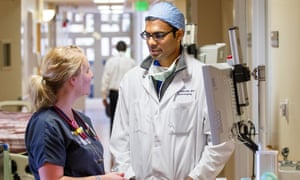A neurosurgeon discovers hope and healing in the face of
a terminal diagnosis.
Paul Kalanithi, a Stanford neurosurgeon, had devoted his life to a vision
of helping the dying. But just as he was finishing his residency,
terminal illness paid a personal visit.Kalanithi died in March 2015,
almost a year before the release of his extraordinary memoir,
"When Breath Becomes Air"
(a No. 1 New York Times Bestseller)
of helping the dying. But just as he was finishing his residency,
terminal illness paid a personal visit.Kalanithi died in March 2015,
almost a year before the release of his extraordinary memoir,
"When Breath Becomes Air"
(a No. 1 New York Times Bestseller)
Cancer, Where Is Your Sting? | Christianity Today
the story shows how he and his wife, Lucy,
both doctors, grew to understand Christianity’s
promise of new life in profound ways.
Death’s Ambassador
As a reader, I have an unfortunate kinship with Kalanithi. I was diagnosed with an incurable cancer less than a year before he received his medical “death sentence.” I was 39; he was 35. Like Paul and Lucy, my wife and I found our lives in a fog. A sinister arithmetic shattered our hopes and plans for the decades ahead: the disease could bring death within months, or years, or decades. We were told to live one day at a time. Kalanithi received the same advice, but found it sorely inadequate. He cuts through this cliché with a surgeon’s scalpel:
The way forward would seem obvious, if only I knew how many months or years I had left. Tell me three months, I'd spend time with family. Tell me one year, I'd write a book. Give me ten years, I'd get back to treating diseases. The truth that you live one day at a time didn't help: What was I supposed to do with that day?
In prose that verges on poetic, Kalanithi exposes the chasm between doctor and patient, one he had never recognized during years of carefully treating dozens of dying patients. He does not offer self-help “lessons” or present himself as a “hero” in the war on cancer. Instead, as a lover of medicine, he fearlessly points to both its potential and its profound limits.
While Kalanithi wrote this book after his diagnosis (in the final 20 months of his life), he found that as he looked back, his whole life seemed to be preparing him for this trial. In college and graduate school, he was obsessed with death and the meaning of life. He studied literature and philosophy with great earnestness. Ultimately, he chose one of the most rigorous medical routes—neuroscience—because it confronted these questions concretely, with real people. He wanted to be present to those with severe brain damage and their families. He could not be their savior, but he could help them navigate their excruciating end-of-life decisions.
Sometimes he acted, in his own words, as “death’s enemy.” But often, he had to be “its ambassador,” preparing his patients for what was to come: “They see the past, the accumulation of memories, the freshly felt love, all represented by the body before them. I see the possible futures, the breathing machines connected through a surgical opening in the neck, the pasty liquid dripping in through a hole in the belly, the possible long, painful, and only partial recovery.” Kalanithi directed his life’s quest toward facing these realities head-on in the presence of the dying. “Had I been more religious in my youth, I might have become a pastor” for the dying, he observes. “For it was the pastoral role that I sought.”
Emotional Toll
Kalanithi’s work took a toll on his marriage. The years he and Lucy spent working long hours in their residencies left them emotionally isolated. When Paul started to worry that he might have cancer, he withdrew. “I feel like we’re connected halfway,” Lucy told him. She needed a week apart to consider the state of their marriage.
...
As he had come to see, “our patients’ lives and identities may be in our hands, yet death always wins. Even if you are perfect, the world isn’t. The secret is to know that the deck is stacked, that you will lose, that your hands or judgment will slip, and yet still struggle to win for your patients.” Kalanithi understood that even the best surgeon cannot “win” against the problem of death. And yet, there remains a responsibility to act with compassion in a world wracked with pain and need.
With story after story, Kalanithi shows how our ambitions to “save the world” run up against sharp limits. Our responses to shocking pain and evil are never enough, and we are likely to lose family, vocation, and perhaps even the desire to live if we do not honestly face our creaturely limits.
Yet Kalanithi goes further, pointing to the One who can face the problem of death. Though “raised in a devout Christian family,” he—“like most scientific types”—came to believe in a material, scientific worldview with no need for God. But he came to recognize this as a kind of idolatry, for science cannot comprehend “love, hate, meaning,” or, most of all, God. “Scientific methodology,” he writes, “is the product of human hands and thus cannot reach some permanent truth.” Science is useful, but limited. Like medicine, it is a helpful servant. But as a master, it will leave you unprepared for the questions that matter most: how to live, how to love, how to die, and whether there is a God who loves us in the midst of it all...


Paul Kalanithi with a colleague at the Stanford hospital and clinics, California, in February 2014. He died 13 months later.
For more readings, click the links below.
://www.nytimes.com/2014/01/25/opinion/sunday/how-long-have-i-got-left.html
